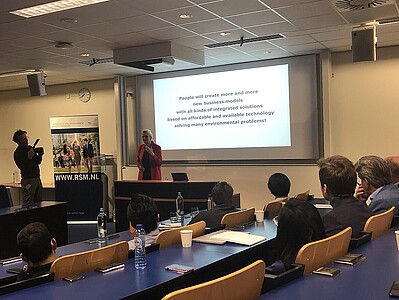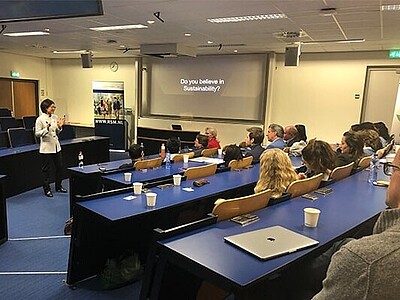
The third SDG Insights event took place on 11 February 2020 and focused on innovation within the industry. It revolved around SDG 9: Industry, innovation and infrastructure. With so much focus on – and progress in – innovation, why is industry so slow to adopt these new and better technologies? Wouldn’t faster adoption be the best way to speed up solving the world’s grand challenges?
Two angles were presented by Meiny Prins, CEO of Priva, and Jing Zhang, Associate Professor of entrepreneurship and innovation at RSM. There was a Q&A session followed by an informal networking reception.
Meiny Prins, CEO of Priva
The first presentation was given by an expert practitioner working at the forefront of innovation in industry – Meiny Prins, CEO of Priva, a family business that supplies building control systems.
The Challenge of Change
Meiny: I see life from the positive side. Because I am convinced that we are just in time to turn around the disastrous consequences of our old economy on the quality of life on our planet. From a technological point of view, we could solve so many environmental issues. The fact that we cannot change now - or do not want to - is really up to ourselves. For instance, with all our subsidies for agriculture and fossil fuels, we maintain systems that are good for the profits of the largest companies on our planet but are not good for our own well-being. But whether people want it or not, things are changing. We are witnessing three major trends at this moment that make the shift happen. It is about adding value, available and affordable technology and 'the city' that will force us into a sustainable world.
So other things will become important. The future is about integrated solutions! So be connected!
Summary of presentation
Meiny Prins introduced Priva and its mission to create a climate for growth. The way they do this is through pioneering in the development and production of technology that optimizes environmental conditions. Meiny spoke about food, agriculture, and horticulture and advocates for the need to use technology more efficiently in our food production. She gave an overview of several issues that the world is facing and the difference that infrastructure and industralisation has and can make on our production processes and the climate. The world spends 7000 billion dollars a year to keep a system alive that destroys our planet, and is extremely profit-driven. Priva is purpose-driven and hopes this spreads across industries. Priva is finalizing a documentary that conveys the technological disruptions we are experiencing and what this does to agriculture and subsequently the climate.
About Priva
Priva is a high-tech company that develops hardware, software and services in the field of climate control, energy saving and optimal reuse of water. With almost 500 colleagues, 16 local offices in 13 countries and over 450 international installation partners Priva delivers sustainable solutions and services in more than 100 countries.
With Priva’s unique combination of hardware, software and services it is perfectly positioned to contribute to Sustainable Urban Deltas: cities where everyone can enjoy a healthy working and living environment and have access to safe and nutritious food.
Dr Ying Zhang, associate professor of Entrepreneurship and Innovation
The second presentation was given by an academic with a cross-disciplinary background in industrial engineering, economics and management: Dr Ying Zhang, associate professor of Entrepreneurship and Innovation, Chinese Economy and Business at RSM. Ying has a cross-disciplinary background in industrial engineering, economics, and management. She presented the role of the UN’s Sustainable Development Goal No. 9, for industry, innovation and infrastructure by considering:
- The role of SDG9 alongside the other 16 SDGs
- Current phenomena in infrastructure and industry
- Fundamental sources of failing to fully achieve SDG 9 and sustainability: Panel Wellbeing Failure (PWF); and Timeline Well-being Failure (TWF)
- Discussion of proposed solutions
Summary of presentation
Dr. Ying Zhang started by asking the audience three questions: What is sustainability? Do you believe in sustainability? Do you think we can reach sustainability? This opened up a discussion about the human race, the capability of adapting to our environment, and how we’ve lived for so long and whether we will be able to find a way to sustain ourselves in the way we live. From political structures, to the difference between humans and animals, to what does or doesn’t get covered in the annual World Economic Forum (WEF) hosted in and more commonly referred to as DAVOS, Professor Zhang explains our strengths and achievements as humans simultaneously being our downfall when it comes to sustainability. We are unable to see the impact of what we are doing currently will have on the future. By sharing anecdotes of her own family, Ying conveys that the generations of the future are warning us of the destruction that we are causing in the present. Professor Zhang discusses what has led to urbanization and industrialization and that this has served as a catalyst for the problems society now faces. Environmental, social, and governance (ESG) reports are highlighted as a well-intended mechanism to measure and safeguard sustainability and impact of investments in companies, but that we are ultimately lacking an index because we have these reports. We need solutions and must find ways to change, but how?
A discussion opened up about industrialization, globalization, and development and what this means for what we can do to solve the global challenges we face.

